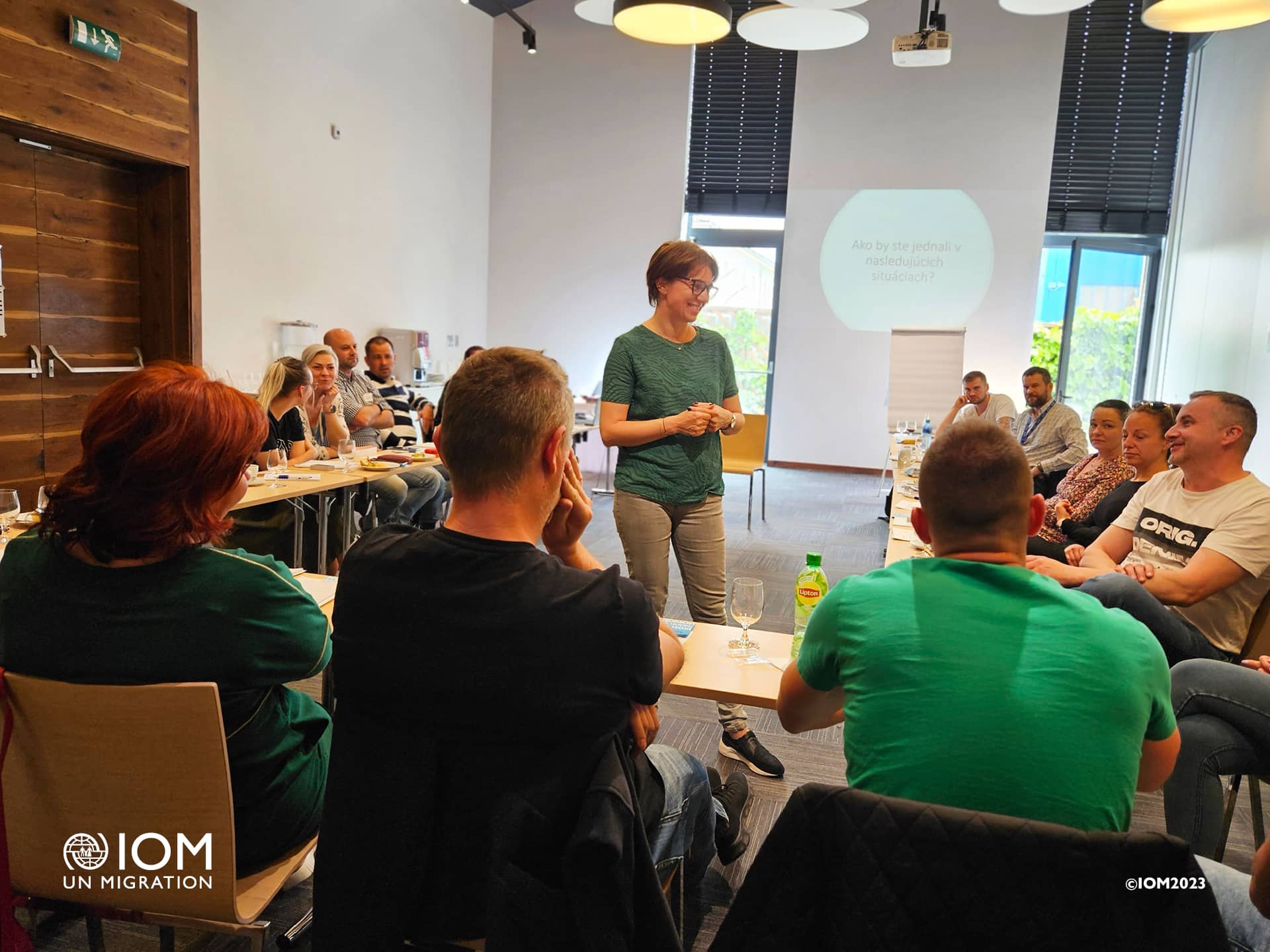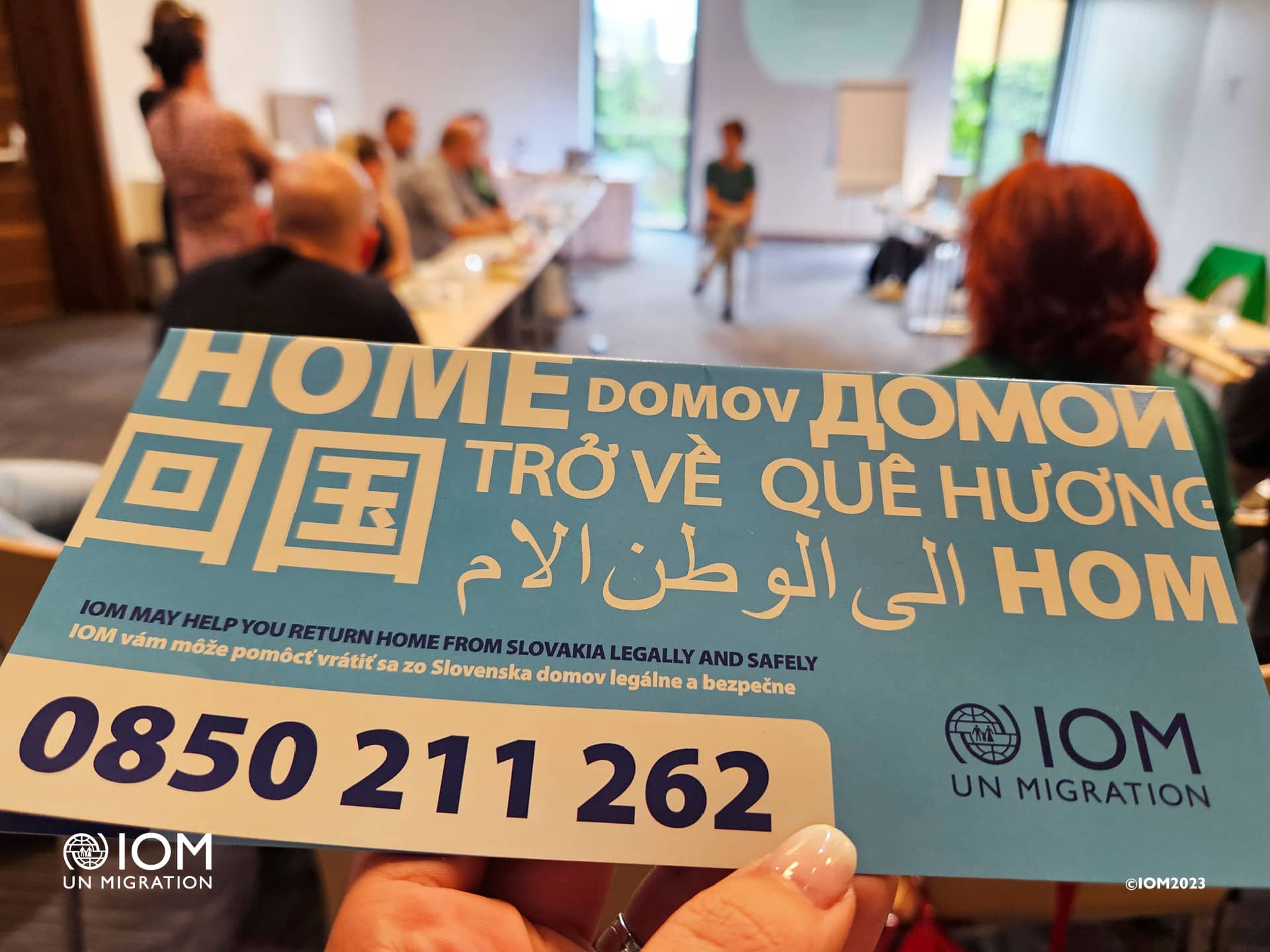Migrants returning from Slovakia to their country of origin may find themselves in a vulnerable situation. Therefore, IOM Slovakia has prepared a series of training sessions for professionals from various institutions and areas of public life on how to identify and subsequently help people in such situations.

One of the trainers from IOM, Zuzana Čačová, is leading workshop about counter-trafficking and communication with potential victims. Photo © International Organization for Migration (IOM) 2023.
“Fast and effective identification of signs of different vulnerable situations is crucial in practice. Trained professionals who encounter migrants can intervene more efficiently and assist individuals in need,” says Juraj Brychta, Head of the Assisted Voluntary Returns and Reintegration Program at IOM Slovakia.
During the training sessions, the team of lecturers from IOM presents specific signs of vulnerable situations in which people may find themselves, as well as the risks associated with them.
“It mainly concerns migrants with health difficulties, unaccompanied children and minors, as well as potential victims of sexual exploitation, abuse or human trafficking. When communicating with people in such situations, it is necessary to proceed with exceptional sensitivity,” adds Brychta.
The most effective technique for detecting signs of a vulnerable situation is through conversation. During a professionally guided conversation, a trained worker can identify signals indicating that a person is in a vulnerable situation. Conversations can also help break down communication barriers that may prevent individuals in such situations from naming their problems.
Through this training, IOM Slovakia increases awareness about the types of vulnerabilities migrants face, including victims of human trafficking. In May 2023, the first of two training sessions focused on raising awareness of migrant vulnerability took place in Košice, targeting officers from the Foreign Police Departments in Košice, Prešov and Rimavská Sobota, the Border Control Department at Košice Airport and the Police Unit for Foreigners in Sečovce. It also included professionals from the Centre for Families and Minors Dlaň in Medzilaborce and the Labour, Social Affairs and Family Office in Prešov.

IOM Slovakia increases awareness about the types of vulnerabilities migrants face. Photo © International Organization for Migration (IOM) 2023.
The second session was also conducted by IOM in May 2023, in Piešťany for employees of the Migration Office of the Ministry of Interior of the Slovak Republic and its facilities in Rohovce, Opatovská Nová Ves and Gabčíkovo, as well as officers from the Police Unit for Foreigners (ÚPZC) in Medveďov and the Foreign Police Departments in Nitra, Nové Zámky, Bratislava, Trnava and Dunajská Streda. A representative from the Slovak Humanitarian Council also participated in the training.
A total of 33 people attended the two training sessions on migrant vulnerability organised by IOM Slovakia.
Participants from various professional fields were made familiar with different communication techniques they can use in communicating with people in vulnerable situations as well as shared work experiences; they also gained a closer understanding of the activities of other institutions.
“In our unit, we work with foreigners every day. The information on how to identify people who may show signs of human trafficking was valuable to me. We worked on techniques for sensitive communication, and I believe that the acquired skills will be actively applied in practice,” says one of the participants, Zuzana Petrusová, who works at the Police Unit for Foreigners in Sečovce.
“Everyone took something valuable from the training. The topic of migrant vulnerability in the context of assisted voluntary returns is current, and there is potential for further training,” concludes Juraj Brychta.
With the support of:

Voluntary return and reintegration in country of origin (individual project). The project is financed by the European Union from the Asylum, Migration and Integration Fund (AMIF). Home Affairs Funds.
 Slovenčina
Slovenčina
 Українська (Україна)
Українська (Україна)
 English
English
